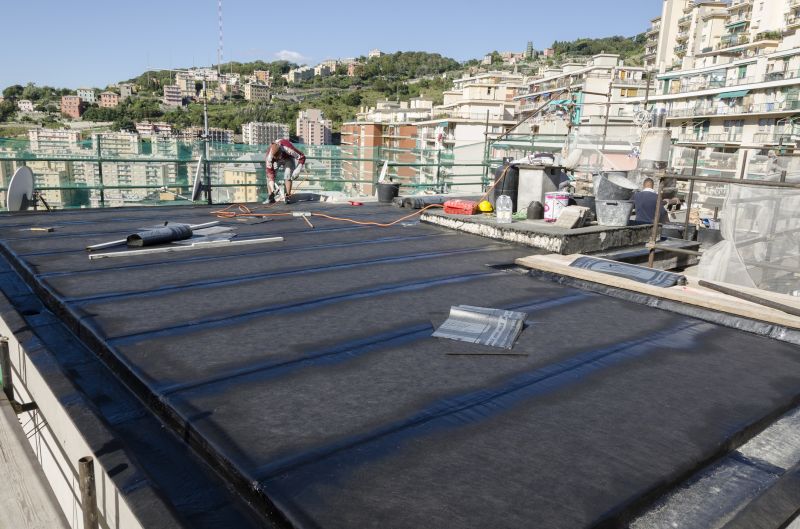Favorite Roofing Service Tools For Professional Results
Identify the most effective tools and accessories used by roofing experts to deliver high-quality work.
 In the realm of roofing services, having the right products is essential for ensuring a durable and reliable roof. From the initial inspection to final repairs, a variety of tools and materials are necessary to achieve quality results. Whether you're a professional contractor or a dedicated homeowner undertaking repairs, selecting appropriate products can influence the longevity and performance of your roofing system.
In the realm of roofing services, having the right products is essential for ensuring a durable and reliable roof. From the initial inspection to final repairs, a variety of tools and materials are necessary to achieve quality results. Whether you're a professional contractor or a dedicated homeowner undertaking repairs, selecting appropriate products can influence the longevity and performance of your roofing system.
Top Overall Option
Roofing Fastener Kit
A comprehensive roofing fastener kit includes a variety of nails, screws, and staples designed specifically for roofing applications. These kits often feature corrosion-resistant materials to withstand weather exposure and ensure secure attachment of shingles, metal panels, or underlayment. They are versatile for different roofing styles and provide a reliable solution for both installation and repairs, making them a valuable addition to any roofing toolkit.
Types of Products For Roofing Service
Roofing Nails
Used to secure shingles, underlayment, and flashing, roofing nails come in various lengths and coatings suitable for different roofing materials.
Roofing Sealants
Sealants help waterproof seams, flashing, and joints, providing an additional barrier against moisture ingress.
Underlayment Material
Underlayment provides an extra layer of protection beneath shingles or metal roofing, aiding in moisture resistance.
Roofing Hammers
Specialized hammers designed for roofing tasks, often featuring magnetic nail holders and lightweight construction for ease of use.
Shingle Removers
Tools designed to safely remove damaged or old shingles without damaging the underlying roof structure.
Safety Harnesses
Personal fall protection equipment essential for working at heights safely during roofing projects.
Roofing Scrapers
Used to remove old roofing materials, adhesives, or debris from the roof surface efficiently.
Metal Roofing Panels
Versatile panels available in various styles and finishes suitable for a range of roofing designs.
Shingles
Available in different materials like asphalt, wood, or composite, shingles are fundamental roofing components.
Flashing Materials
Metal or plastic flashing helps direct water away from vulnerable areas such as valleys and chimneys.
Roof Ventilation Products
Vents and exhaust fans improve airflow within the attic space, aiding in temperature regulation and moisture control.
Roofing Adhesives
Specialized adhesives assist in bonding roofing components securely, especially in cold or challenging conditions.
Roofing Brushes and Rollers
Tools designed for applying sealants, coatings, or protective finishes on roofing surfaces.
Gutter Cleaning Tools
Equipment to clear debris from gutters, ensuring proper drainage and preventing water damage to the roof and foundation.
Roof Inspection Cameras
Portable cameras that help inspect hard-to-reach areas of the roof for damage or wear.
Popular Choices
A pneumatic or electric nail gun speeds up the installation process by efficiently fastening shingles or panels.
Pre-measured rolls of underlayment material that provide a protective barrier against moisture and wind-driven rain.
Heavy-duty ladders designed for safe access to roofs during installation or maintenance.
Essential for fall protection, these harnesses are widely used by roofing professionals and DIY enthusiasts.
Multiple styles and materials available, suitable for various aesthetic preferences and roofing needs.
A tool for applying sealants precisely around flashing, vents, and seams to prevent leaks.
Convenient for keeping essential tools within reach during roofing projects.
All-in-one kits containing patches, sealants, and tools for small repairs and maintenance.
Aerial drones equipped with cameras for detailed roof inspections, especially for large or hard-to-reach areas.
Components that cover roof vents, helping to prevent water infiltration and improve airflow.
Self-adhesive tape used to seal around flashing and joints for added waterproofing.
Heavy-duty brushes designed to remove moss, dirt, and debris from roofing surfaces.
Roofing projects often require specialized equipment to facilitate safety, precision, and efficiency. Items such as roofing nails, sealants, and underlayment materials are fundamental components that contribute to a secure installation. Additionally, tools like roofing hammers, shingle removers, and safety harnesses help streamline the work while maintaining safety standards.
Understanding the different product types available can help you make informed decisions tailored to your specific roofing needs. For example, choosing the right underlayment can provide an extra layer of protection against moisture, while selecting appropriate fasteners ensures the stability of shingles or metal panels. Proper selection and use of these products can significantly impact the overall quality and durability of the roofing project.
Proper maintenance and repair also depend on having access to quality replacement parts and tools designed for longevity and ease of use. Regular inspections and timely repairs using suitable products can extend the lifespan of a roof and prevent costly damages. Whether working on residential or commercial properties in Crete, IL, being equipped with the right products is a key step toward successful roofing projects.
Key Buying Considerations
- Compatibility with your specific roofing material, such as shingles, metal, or tiles.
- Weather resistance and durability of the products to withstand local climate conditions.
- Ease of installation and whether the product is suitable for DIY use or professional application.
- Safety features, especially for tools and equipment used at heights.
- Corrosion resistance, particularly for fasteners and metal components exposed to moisture.
- Compatibility with existing roofing components and materials.
- Product certifications or standards that ensure quality and safety.
- Availability of replacement parts or accessories for ongoing maintenance.
- Weight and portability of tools for ease of handling during projects.
- Cost-effectiveness and whether the product offers good value for the intended application.
- Brand reputation and reviews from other users in similar projects.
- Warranty or guarantee provisions that protect your investment.
- Environmental considerations, such as non-toxic sealants or adhesives, if relevant.
- Storage and handling requirements for bulk materials or large tools.
- Compatibility with safety gear and personal protective equipment.
